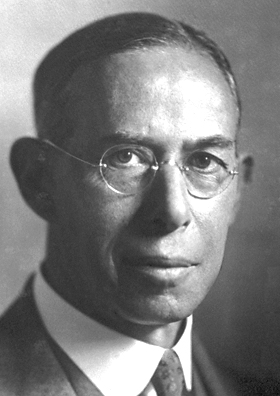Joseph Erlanger
Joseph Erlanger (January 5, 1874 – December 5, 1965) was an American physiologist who, along with Herbert Spencer Gasser, was awarded the Nobel Prize in Physiology or Medicine in 1944 for their discoveries relating to the highly differentiated functions of single nerve fibers. This work was crucial in understanding the electrophysiology of nerves and has had a profound impact on the field of neuroscience.
Biography[edit | edit source]
Joseph Erlanger was born in San Francisco, California, to parents who had emigrated from Bavaria. He completed his undergraduate education at the University of California, Berkeley, and received his medical degree from the Johns Hopkins University in 1899. After completing his medical degree, Erlanger began his career in research and teaching, which would span over six decades.
Erlanger's early work was in the field of cardiology, where he made significant contributions to understanding the electrocardiogram. However, his most notable work was in the field of neurophysiology, particularly in his collaboration with Herbert Spencer Gasser. Together, they used the cathode ray oscilloscope to amplify and record the electrical signals from nerve fibers, which allowed them to demonstrate that different fibers in the same nerve could have different functions, based on their diameter and speed of conduction. This discovery was groundbreaking and laid the foundation for much of modern neuroscience.
Nobel Prize[edit | edit source]
In 1944, Erlanger and Gasser were jointly awarded the Nobel Prize in Physiology or Medicine "for their discoveries relating to the highly differentiated functions of single nerve fibers." Their work was instrumental in the development of the field of neurophysiology and has influenced countless research studies in neuroscience and related fields.
Legacy[edit | edit source]
Joseph Erlanger's contributions to the field of physiology and neuroscience are immense. His work has helped to elucidate the complex functions of nerve fibers and has had a lasting impact on the study of the nervous system. Erlanger's research has paved the way for advances in understanding neurological disorders and in the development of treatments for such conditions.
Erlanger was also a dedicated educator, teaching and mentoring numerous students throughout his career. His legacy is not only in his scientific discoveries but also in the generations of scientists he inspired.
Selected Publications[edit | edit source]
Erlanger published extensively throughout his career. Some of his most notable publications include studies on the differentiation of nerve fibers, the physiology of the heart, and the effects of anesthesia on nerve transmission.
Awards and Honors[edit | edit source]
In addition to the Nobel Prize, Joseph Erlanger received numerous awards and honors throughout his career, reflecting his significant contributions to science and medicine. These include membership in the National Academy of Sciences and the American Philosophical Society, among others.
Death[edit | edit source]
Joseph Erlanger passed away on December 5, 1965, leaving behind a legacy of scientific achievement and inspiration. His work continues to influence the fields of physiology and neuroscience.
Translate: - East Asian
中文,
日本,
한국어,
South Asian
हिन्दी,
தமிழ்,
తెలుగు,
Urdu,
ಕನ್ನಡ,
Southeast Asian
Indonesian,
Vietnamese,
Thai,
မြန်မာဘာသာ,
বাংলা
European
español,
Deutsch,
français,
Greek,
português do Brasil,
polski,
română,
русский,
Nederlands,
norsk,
svenska,
suomi,
Italian
Middle Eastern & African
عربى,
Turkish,
Persian,
Hebrew,
Afrikaans,
isiZulu,
Kiswahili,
Other
Bulgarian,
Hungarian,
Czech,
Swedish,
മലയാളം,
मराठी,
ਪੰਜਾਬੀ,
ગુજરાતી,
Portuguese,
Ukrainian
Navigation: Wellness - Encyclopedia - Health topics - Disease Index - Drugs - World Directory - Gray's Anatomy - Keto diet - Recipes
Search WikiMD
Ad.Tired of being Overweight? Try W8MD's physician weight loss program.
Semaglutide (Ozempic / Wegovy and Tirzepatide (Mounjaro / Zepbound) available.
Advertise on WikiMD
WikiMD is not a substitute for professional medical advice. See full disclaimer.
Credits:Most images are courtesy of Wikimedia commons, and templates Wikipedia, licensed under CC BY SA or similar.Contributors: Prab R. Tumpati, MD

